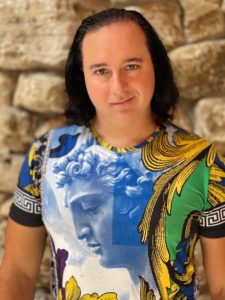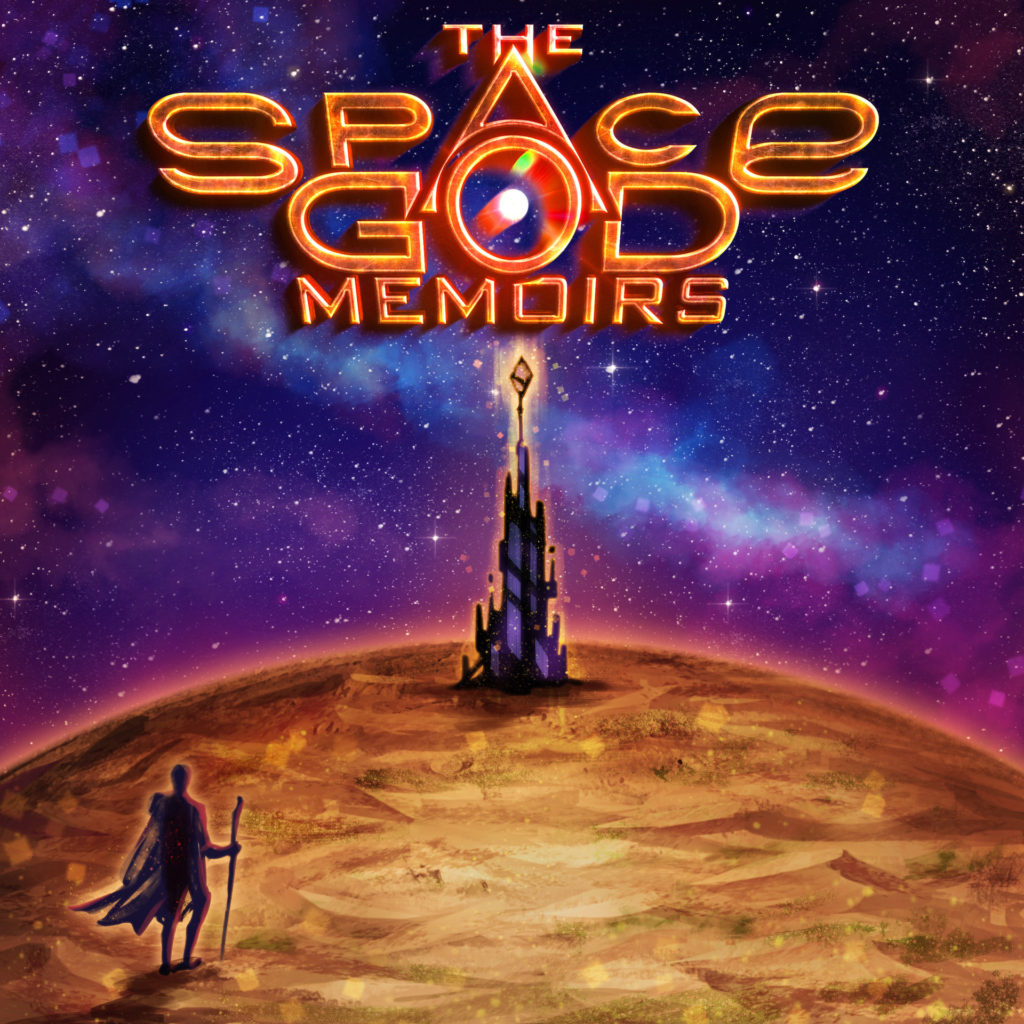BWW member Alex Oleksiuk, pen name A.M. Arktos, describes the journey of writing and producing his upcoming podcast series, The Space God Memoirs.

Alex Oleksiuk
As I near the final stages of launching my first audio fiction podcast, I can see that my years spent in the Chicago improv scene, acting classes, and a number of voice-over lessons have paid off. I chose the audio format as it seems the best medium to bring my characters and world into existence.
The podcast story is set in a science-fantasy universe of soul powered technology, galactic warfare and sentient starships. Space God is a tale filled with action and adventure, a touch of humor, and a dash of spirituality. It is a continuing story told by Keph, a young adventurer from a backward planet, who finds himself pulled into a conflict of cosmic proportions. The original idea for the series came to me in a dream, though it features an amalgamation of ideas inspired from role-playing games, ancient astronaut theory, and all the weird media I’ve consumed over the years.
By the time I finished the first draft I was writing with audio in mind. Like many people I enjoy listening to fiction, and in recent years I’ve gotten more into audio books than paper ones. I knew it would be a daunting task.
The early stages of preparing Space God were similar to writing a novel. Writing drafts, editing them, re-arranging the chapters, removing characters, adding characters, putting together swathes of lore that was mostly for my own reference, etc. I went through multiple revisions of what became the first season of Space God, assisted by constant commentary from my faithful BWW writers group. I spent many moons during the pandemic poring over my documents and refining my work, delving deep into the Space God universe and channeling Keph into this reality.
Equipment needed
To record audio, I needed a few basic pieces of equipment. A microphone is essential, of course. While every cell phone, gaming headset and webcam come with built-in mics, those won’t do at all for anything vaguely professional sounding. What I ended up using is the Yeti, a decent entry-level mic that still produces good quality sound. It does what I need it to do.
For recording software, I went with a free program called Audacity which I already knew how to use from some hobby recordings I’ve done over the years. It has most of the features of more expensive programs.
As 2020 neared its close, I was finally ready to record. Well…sort of. At first, I had to prepare my space. Audio recording is a sensitive process, and any decent microphone will pick up all manner of background noise from passing trains, chirping birds, rumbling appliances and whatnot. I needed a place of silence, a chamber hermetically sealed from outer distractions. The walk-in closet in my office was ideal: big enough to fit my gear, in a relatively quiet part of the house, with shag carpeting on the floor. I covered the walls in padding; I first used a bunch of worn-out blankets and then moved up to studio foam panels. A nook outside of the closet had just enough room for me to move an old PC there and hook it up. I connected it to my trusty Yeti microphone and moved said microphone into the recording chamber, astride its stand. At a local music store, I acquired a matching stand for my scripts.
Making a recording
I was ready. In the dead of winter, I began to record. Any nearby Christmas carolers or jingle bells were muffled behind my padded walls. Yet as I began my reading, I started to notice a most perplexing sound intruding into my booth. After searching my recording booth thoroughly, I discovered the culprit: the closet’s sole overhead light, a bucket-light inset in a metal cannister. Some laborious unscrewing and I was ready to begin recording.
My goal was to record and produce the entire first season of Space God before launching it, thus giving me enough time to develop a routine of recording one season while I write the next.
The recording process has been like this:
-Do an initial take on recording an episode. This requires a steady voice with emphasis and changes in tone when appropriate.
-Go back through said episode and re-record lines I obviously messed up or didn’t like the sound of (using the aforementioned Audacity software). Eliminate background noises, clicks, pops, add silences, and delete garbage.
-Go through the episode a second time to make sure everything is timed right, flows, and delete re-takes, etc.
-Re-record anything that didn’t come out right before, cut-and-paste the new stuff in.
-Add background sounds and music, where appropriate. Balance the music vs. narration, add intro and credits.
Spicing up with sound effects
I could have gone with simple narration, old audio-book style, with hardly any bells, whistles or explosions. Instead, I opted for something a tad spicier that I describe as halfway between straight narration and a full-on audio drama. For that I needed sound effects: laser blasts, explosions, creepy bugs, cosmic wonder, along with the right music to set the tone. And even though I’m no musician, there are a multitude of places online to find royalty-free sounds.
I ended up purchasing several packs of sound effects, containing terabytes of data, and downloaded dozens of royalty-free songs to fit a variety of moods. Naturally, going through all of these sounds was a task unto itself. For several weeks most of my work-time went into listening to sound after sound, categorizing them, describing them and deciding where they could possibly fit into my narrative. This may have been tedious and could have been maddening save for the fact that—like the rest of the process—it was somewhat fun as well.
The whole experience of creating an audio podcast has been like that: hard work, unfamiliar territory and at times tiring. As I put the final touches on each episode I can feel my creation taking shape. The characters and universe are coming to life through voice and music to form something more than just the writing I had on a page. It’s now 2021 and I’ve finished producing Episode 32, marking the end of Season One of the series. Episodes average around fifteen minutes apiece.
My next step is to get some artwork commissioned, get the social media rolling, and begin advertising on appropriate sites where my audience is.
The Space God Memoirs is a living story set in a vibrant universe. I’ll be happy to share my creation soon with the people of this planet, and beyond.

